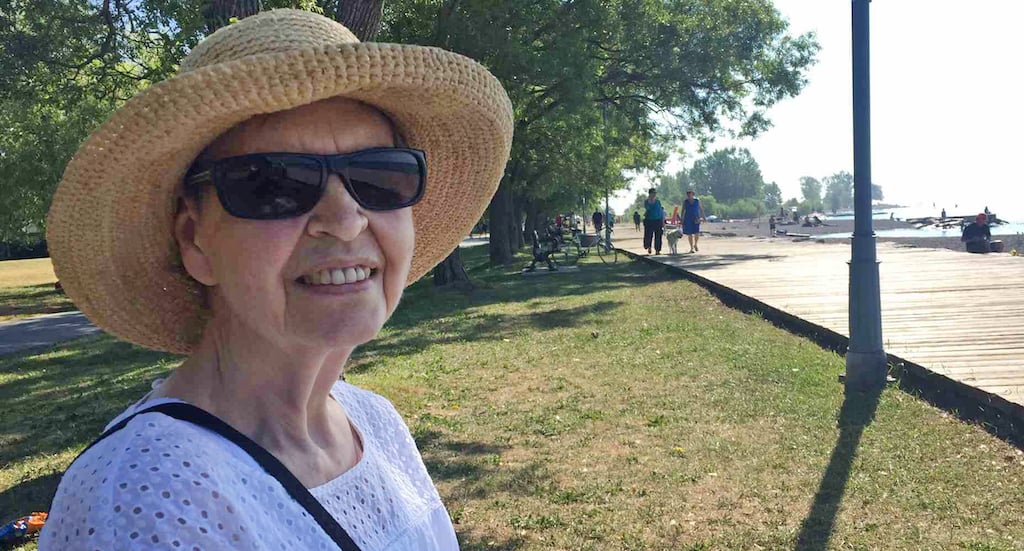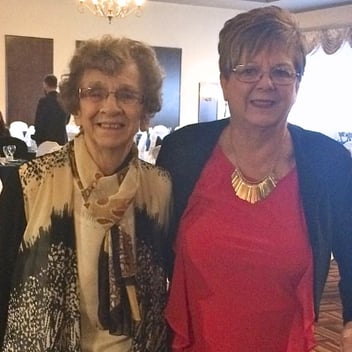A Bridge Too Far: The Story of Tracy, Her Mom, and the Good Samaritan
 Estimated reading time: 4.5 minutes
Estimated reading time: 4.5 minutes
“Did you find her!?... They’ve been searching for her for like…I’m sorry. I’m sorry. I’m falling apart here…Thank you. Thank you.”
After 17 hours of not knowing where her mother was, the relief in Tracy’s voice is palpable. Nearly three years later, listening back to the phone call that changed her life, Tracy still gets emotional.
“I actually can’t believe how coherent I was,” she says from her Toronto home.
The 55-year-old former marketing executive had never heard the MedicAlert 24/7 Hotline phone call between herself, the MedicAlert emergency response agent, and Frank, the good Samaritan who found her 71-year-old mother, Jean, struggling to walk across a bridge more than 20km from home in June 2020. “At that point I hadn’t slept at all. The police had been out looking for hours. We had been searching. Things were getting closer to the time where… well, you just don’t want to think about what could have happened.”
Sadly, Tracy’s story is not unique. Every year, thousands of people living with Alzheimer’s or other dementias will wander. Some are found with serious injuries or health impacts from other conditions they may have. Some never make it home again. These are the outcomes families fear the most.
Yet new research conducted by the University of Waterloo School of Public Health, shows that for those who have MedicAlert’s Safe & Found service, 91% individuals are returned to the care of loved ones unharmed and without significant signs of health trauma. What’s more, in 46% of wandering incidents involving MedicAlert, people are found by good Samaritans.
“That statistic speaks to the community’s recognition of the best-known component of MedicAlert’s services,” notes Dr. Stefanie Tan, MedicAlert’s Associate Vice President of Research, Innovation and Programs. “Our body-worn jewelry is instantly recognizable. People automatically know what to do when they see someone in distress who wears one of our IDs. And because our live operators have access to a complete health record, if someone is exhibiting other signs of trauma, they can relay information that can have a positive impact on the person’s health outcome.”
In the case of Tracy’s mother, who also lives with diabetes and a heart condition, it was important that she be rehydrated quickly. “The only thing she left the house with was her keys. It was hotter than Hades, and at this point in her disease progression she had started to forget to eat, so I’m sure she’d had nothing to eat or drink. If it had gone much longer, I’d hate to think what might have happened.”
Jean’s wandering incident came without much warning. “My mother was always so prepared for everything,” Tracy says of the former Superintendent of a women’s correctional facility just west of Toronto. “But when she was diagnosed in 2018, we thought we’d better be safe than sorry, so I put GPS tracking on her phone. One day I had called to see if she was home, so I could drop off some meals to her. She said she was downtown shopping but was on her way home. I looked at the tracker and I literally watched her going in circles on the subway line. She kept missing her stop. So I told her to stay put and I went to get her.”
Tracy never thought of the subway incident as wandering. She also never thought her mother would go missing for 17 hours just a few weeks later, or how much the ordeal would impact her life.
“I was so grateful to Frank and his daughter for their kindness and generosity – for taking the time to stop and help my mother. The police were amazing, too. They had so little to work with because my mom didn’t have a history of wandering, but they kept touching base and stopping by the house reassuring us that patrol cars were on the lookout for her.”
While Jean was returned home safe and unharmed, the worry didn’t stop for Tracy. “Honestly in the next few days I got really scared. What if it happened again? I thought the GPS phone tracker was there to help me find her. But that only works if she has her phone.”
That’s where Tracy is so grateful for MedicAlert. “She wore her blue Safe & Found necklace all the time,” she says, “and we’d attached her bracelet to her keys when she started to become agitated by the feel of it around her wrist. Having two MedicAlert IDs was one of our best decisions.”
After the wandering incident, Tracy’s life took a major turn. “My mom was never alone after that. We took turns sleeping on the couch at her apartment. We hired a personal companion to come in a couple of hours each day, so we could get some respite, and we did get some nursing support.”
Eventually, Tracy and her husband took the significant step of moving to a new home where they could bring her mother to live with them full time. “I am grateful that we had the means to do all of this to support my mother. I can’t imagine what it is like for other families who don’t have the resources we do. But the best investment we made was the least expensive, and that was MedicAlert.”
While there is still no cure for Alzheimer’s and other dementias, MedicAlert’s research, which examined hundreds of thousands of datapoints from the MedicAlert Subscriber Health Information Database, is showing promise for new interventional safety solutions that could give families like Tracy’s a new set of tools in their toolkits to keep loved ones safe.
“We’re hopeful our ongoing work with Dr. Lili Liu and her team at the University of Waterloo will yield some exciting breakthroughs in personal safety in the very near future,” says Dr. Tan.
That’s welcome news to Tracy. “I already give MedicAlert a 10 out of 10 for being the service that helped us to find my mom. The worst thing for families is having no idea when to expect a wandering incident, but if there is research that could lead to some kind of tool or tools that would help people to have visibility into when a family member might wander, that would be incredible and would ease a great deal of stress.”
Today, Jean lives in a long-term care home. Her disease has progressed rapidly and is at the point where she will likely lose her mobility soon. But Tracy is grateful for the days where her mom is more lucid and they can have conversations about family, the weather and her mom’s favourite pastime, Scottish dancing.
The Good Samaritan
MedicAlert is grateful that there are so many Canadians who recognize the authentic MedicAlert bracelet. Without Good Samaritans in addition to first responders, our subscribers might not have the positive outcomes they do when we can provide appropriate information at the time of a health emergency.
Frank and his daughter were the Good Samaritans who helped Tracy’s mother, Jean, as she struggled to cross a bridge in the blazing heat after being lost overnight.
Take a listen to Frank’s call to our 24/7 Hotline, and the absolute relief in Tracy’s voice when she knew her mum was safe thanks to Frank and MedicAlert.
If you would like to learn more about MedicAlert’s Safe & Found Program or you would like to support further research work, visit us at www.medicalert.ca/safe-and-found.



